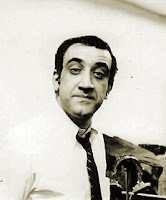The End
When my friend and partner Sir Lattimore Brown was killed early this year, it felt like the end of something. As I stood there in the cold Florida sun and attempted to deliver some kind of eulogy for him, my words rang hollow in my ears. The March winds rose up and blew them all away. This life, this music, this very real art that Lattimore and his generation had created was fading swiftly and inexorably into the past, and it seemed all I could do was watch as it slipped through my fingers.
That's what it felt like.
I believe we are witnessing 'the end of an era' here. In the most recent issue of In The Basement (which will cease to exist itself this Spring), John Waters wrote that "Soul is in its last death throes... the great names that made the music we love are becoming ever thinner on the ground." Indeed, as each week seems to bring some more sad news...
Don't get me wrong, I'm not complaining. It's like Hyman Roth tells Michael; "This is the business we have chosen..." As the 'Soul Era' recedes further and further in the rear view mirror, I think we need to continue to celebrate the vibrant and living music this generation is leaving behind them, but accept the fact that it comes from a time and place that we will never see again.
The Robins - Smokey Joe's Cafe (Atco 6059)
Smokey Joe's Cafe
Jerry Lieber and Mike Stoller had made a name for themselves out on the West Coast, writing songs for folks like Charles Brown, Ray Charles and Little Esther, but it was the number they composed for Big Mama Thornton that put them on the map. After Don Robey refused to pay up when Hound Dog took the country by storm, they decided to start their own label, Spark. Although they cut some great records, it was the last one they released on the label that made all the difference, and it's hard to imagine a more significant recording than this one. As Lieber said in Hound Dog - The Lieber & Stoller Autobiography: "The Robins got it... Carl Gardner sang a perfect lead."
When friend and fellow Central Avenue Jazzbo Nesuhi Ertegun heard it, he proclaimed it "nothing short of sensational," and sealed the deal with his brother Ahmet back in New York that brought Lieber & Stoller to Atlantic. Re-issued on Atco in October of 1955, Smokey Joe's Cafe would cruise into the R&B top ten and change the face of American popular music forever. Carl Gardner made the trip back East with Jerry and Mike, and would form the foundation of The Coasters for the next fifty years, singing lead on all of their big hits. He passed away on June 12th, Jerry Lieber died on August 22nd.
Howard Tate - You Don't Know Nothing About Love (Atlantic 2860)
You Don't Know Nothing About Love
Another of the great New York based songwriters and producers left us on July 13th, Jerry Ragovoy, who was the force behind some of the greatest records ever made. He wrote Time Is On My Side (along with Jimmy Norman who also died this year), for instance, and Piece Of My Heart and Cry Baby (with Bert Berns). He was a genius in the studio as well, building his own trademark sound to crescendos that few have ever equalled. The records he cut with Lorraine Ellison in the late sixties have remained underground favorites for years, but it is his work with Howard Tate that captures one's imagination. Get It While You Can is, as Larry Grogan says,"an example of all that was great about 60's Soul... alongside great soul ballad tours de force like Otis Redding’s Try a Little Tenderness and James Carr’s Dark End of the Street"
In any event, this great Ragovoy written and produced number would surface years later as the cornerstone of Irma Thomas' excellent Rounder LP The Way I Feel. The reunion of Howard and Jerry for the 2003 album, Rediscovered, is one of the great stories to come out of this whole Soul revival thing, and I'm thankful to the folks at the Ponderosa Stomp for making it possible for me to have seen him perform live. He was awesome. Howard Tate passed away on December 2nd.
Howlin' Wolf - Three Hundred Pounds of Joy (Chess 1870)
Howlin' Wolf - Three Hundred Pounds of Joy (Chess 1870)
Three Hundred Pounds of Joy
What Can I Say? The Wolf's high voltage delivery of some of Willie Dixon's greatest lyrics ever make this one of my favorite records of all time (there are those who would tell you it's actually my 'theme song'). Be that as it may, it is Hubert Sumlin's stinging, incisive guitar work that keeps it from ever leaving the ol' jukebox. Released in 1963, it is Hubert's clean tone that launched the British invasion, and is (as he would gladly tell you himself) the place where Eric Clapton got it from. After Wolf died in 1976, Hubert went on to get some of the recognition he deserved, and was a fixture on the 'Blues Circuit', where I caught him every chance I got. The last time I saw him was at the Crawfish Fest out in New Jersey a few years ago, where I took my kids by the hand and planted them in front of the stage. "Remember this moment," I told them, "this man is living history." Hubert Sumlin left us on December 4th.
Please join me in saying goodbye to those who have gone on to glory before us here in 2011:











































